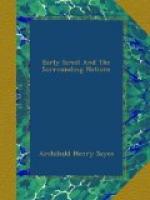[If servants shall flee away] out of the territories of Ramessu Mi-Amun [the great prince of Egypt, to betake themselves to] the great king of the Hittites, the great king of the Hittites shall not receive them, but the great king of the Hittites shall give them up to Ramessu Mi-Amun, the great prince of Egypt [that they may be punished].
If servants of Ramessu Mi-Amun, the great prince of Egypt, leave his country and betake themselves to the land of the Hittites, to make themselves servants of another, they shall not remain in the land of the Hittites [but shall be given up] to Ramessu Mi-Amuu, the great prince of Egypt.
If, on the other hand, there should flee away [servants of the great king of the Hittites, in order to betake themselves to] Ramessu Mi-Amun, the great prince of Egypt [in order to stay in Egypt], then those who have come from the land of the Hittites in order to betake themselves to Ramessu Mi-Amun, the great prince of Egypt, shall not be [received] by Ramessu Mi-Amun, the great prince of Egypt, (but) the great prince of Egypt, Ramessu Mi-Amun, [shall deliver them up to the great king of the Hittites].
[And if there shall leave the land of the Hittites persons] of skilled mind, so that they come to the land of Egypt to make themselves servants of another, then Ramessu Mi-Amun shall not allow them to settle, he shall deliver them up to the great king of the Hittites.
When this [treaty] shall be known [by the inhabitants of the land of Egypt and of the land of the Hittites, then shall they not offend against it, for all that stands written upon] the silver tablet, these are words which will have been approved by the company of the gods, among the male deities and among the female deities, among those namely of the land of the Hittites, and by the company of the gods, among the male deities and among the female deities, among those namely of the land of Egypt. They are witnesses for me [to the validity] of these words.
This is the catalogue of the gods of the land of the Hittites:—
[Sutekh of the city of] Tump (Tennib). Sutekh of the land of the Hittites. Sutekh of the city of Arnema. Sutekh of the city of Zaranda, Sutekh of the city of Pairaka. Sutekh of the city of Khisasap. Sutekh of the city of Sarsu. Sutekh of the city of Aleppo. Sutekh of the city of ... [Sutekh of the city of ...] Sutekh of the city of Sarpina. Astartha of the land of the Hittites. The god of the land of Zaiath-Khirri. The god of the land of Ka ... The god of the land of Kher ... The goddess of the city of Akh ... [The goddess of the city of ... ] and of the land of A ... ua. The goddess of the land of Zaina. The god of the land of ... nath ... er.
[I have invoked these male and these] female [deities of the land of the Hittites; these are the gods] of the land, as [witnesses to] my oath. [With them have been associated the male and the female deities] of the mountains and of the rivers of the land of the Hittites, the gods of the land of Kazawadana (Cappadocia), Amun, Ra, Sutekh, and the male and female deities of the land of Egypt, of the earth, of the sea, of the winds, and of the storms.




